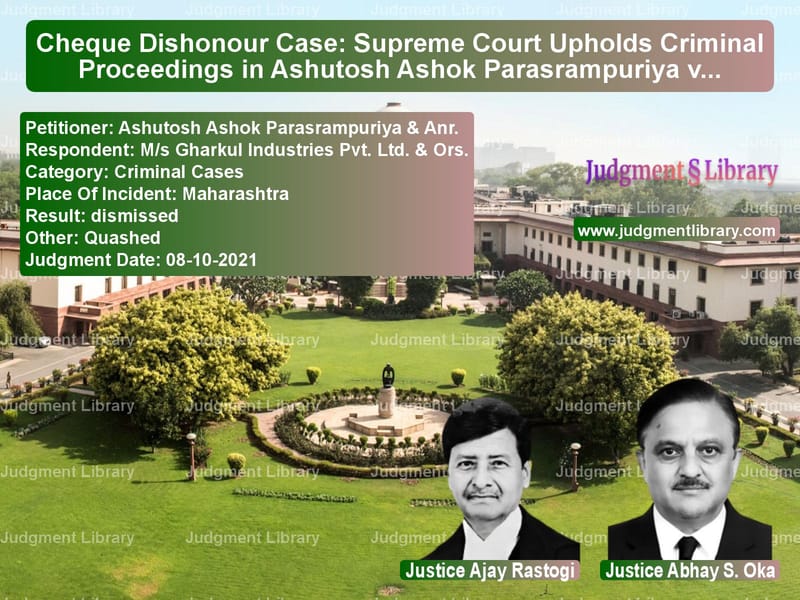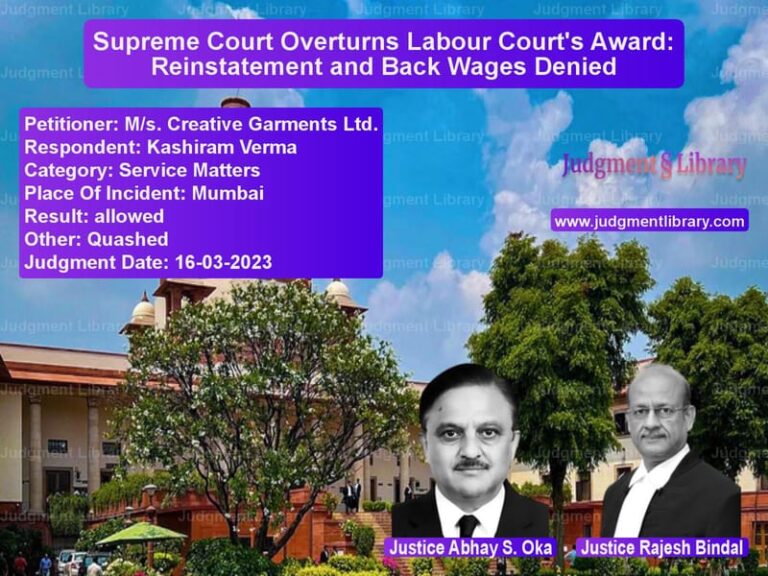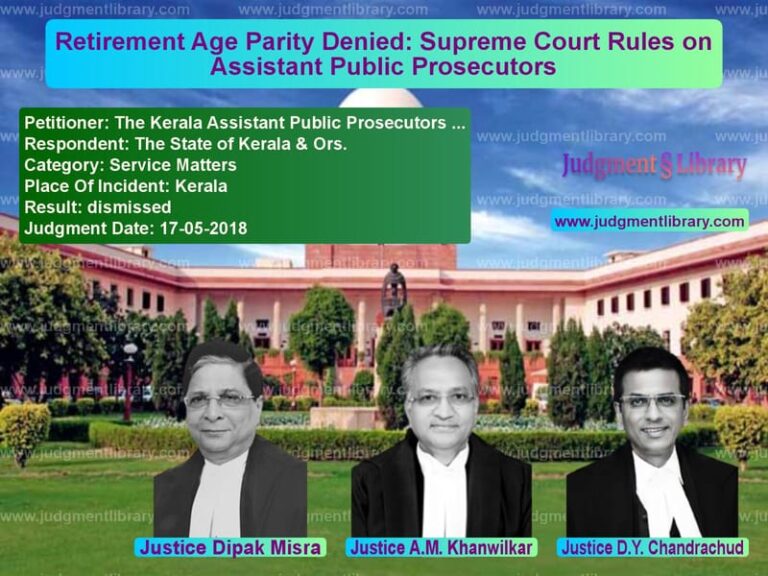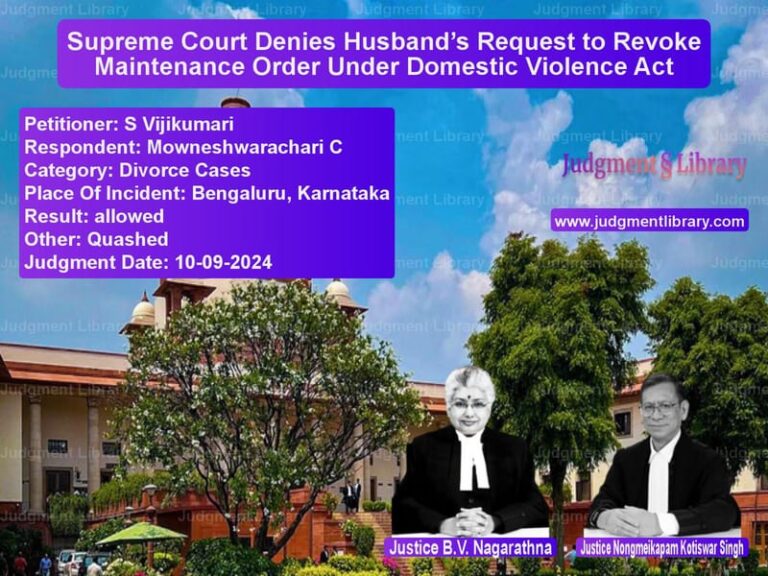Cheque Dishonour Case: Supreme Court Upholds Criminal Proceedings in Ashutosh Ashok Parasrampuriya v. M/s Gharkul Industries Pvt. Ltd.
The Supreme Court of India recently delivered a judgment in Ashutosh Ashok Parasrampuriya & Anr. v. M/s Gharkul Industries Pvt. Ltd., a significant case under Section 138 of the Negotiable Instruments Act, 1881 (NI Act). The Court upheld the criminal proceedings against the appellants, dismissing their plea for quashing the case. This ruling reinforces the importance of financial accountability and clarifies the liability of company directors in cheque dishonour cases.
Background of the Case
The case originated when M/s Gharkul Industries Pvt. Ltd., a private limited company dealing in spices, provided financial assistance to the appellants, who were directors of Ameya Paper Mills Pvt. Ltd.. This financial assistance was given through multiple cheques under a Memorandum of Understanding (MoU) signed by one of the directors.
The appellants were expected to return the money within a stipulated time, but when a cheque of Rs. 10,00,000 issued on June 2, 2012 was dishonoured due to ‘insufficient funds,’ the complainant initiated proceedings under Section 138 of the NI Act. Despite legal notices, the appellants failed to make the payment, leading to the filing of a criminal complaint.
Legal Issues Examined
- Whether the appellants, as directors, could be held vicariously liable for the dishonoured cheque.
- Whether the High Court erred in dismissing the plea to quash the complaint under Section 482 of the CrPC.
- Whether sufficient material was presented to justify summoning the accused under Section 138 of the NI Act.
- Whether procedural compliance, including issuance of notice, was met in this case.
Petitioner’s (Ashutosh Ashok Parasrampuriya & Anr.) Arguments
The appellants contended:
- They were not signatories to the dishonoured cheque and could not be held liable under Section 138 of the NI Act.
- There was no specific averment that they were in charge of or responsible for the company’s business at the time of the offense.
- They were merely non-executive directors who were not involved in the day-to-day operations of the company.
- The legal notice was not served to them individually, violating procedural requirements.
Respondent’s (M/s Gharkul Industries Pvt. Ltd.) Arguments
The complainant, represented by counsel, argued:
- The appellants were actively involved in the financial dealings of the company.
- The company issued multiple cheques, and the accused confirmed the financial liabilities in official correspondence.
- The cheque in question was issued to settle outstanding dues under an MoU that was signed with their consent.
- The directors had a duty to ensure financial commitments were honored, making them liable for the dishonour.
Supreme Court’s Observations
Vicarious Liability of Directors
The Court emphasized that directors can be held responsible under Section 141 of the NI Act if they were in charge of and responsible for the conduct of the company’s business at the relevant time. The ruling stated:
“If a director is responsible for the company’s affairs and financial transactions, they cannot escape liability merely by claiming they were not signatories to the cheque.”
Role of the High Court Under Section 482 CrPC
The Supreme Court ruled that the High Court should not have interfered at the preliminary stage and dismissed the quashing petition, stating:
“The High Court cannot act as a trial court at the stage of issuing summons. A case should proceed to trial if the complaint contains sufficient material to establish prima facie liability.”
Procedural Compliance
The Court held that the notice under Section 138 was properly issued and that mere refusal to accept the notice does not absolve the accused. It noted:
“Failure to claim a notice sent via registered post is deemed as valid service.”
Final Judgment
The Supreme Court upheld the High Court’s decision, ruling:
- The complaint under Section 138 of the NI Act was legally maintainable.
- The appellants could not escape liability solely on the ground of being non-signatory directors.
- The case would proceed to trial.
Significance of the Judgment
- Reinforces Director’s Liability: Directors actively involved in company affairs can be held accountable for cheque dishonour.
- Limits Judicial Interference: High Courts should not quash complaints under Section 482 CrPC if prima facie material exists.
- Clarifies Notice Requirements: If a notice is refused or unclaimed, it is still considered valid.
- Protects Lenders and Creditors: Strengthens the legal framework to hold companies accountable for financial commitments.
Conclusion
The Supreme Court’s judgment in Ashutosh Ashok Parasrampuriya v. M/s Gharkul Industries Pvt. Ltd. sets a crucial precedent in cheque dishonour cases. It reinforces that directors who are involved in financial transactions cannot evade liability under the NI Act, even if they are not signatories to a dishonoured cheque. This decision will serve as a guiding principle for similar cases in the future, ensuring greater financial discipline among companies and their directors.
Read also: https://judgmentlibrary.com/supreme-court-cancels-anticipatory-bail-in-madhya-pradesh-murder-case/
Petitioner Name: Ashutosh Ashok Parasrampuriya & Anr..Respondent Name: M/s Gharkul Industries Pvt. Ltd. & Ors..Judgment By: Justice Ajay Rastogi, Justice Abhay S. Oka.Place Of Incident: Maharashtra.Judgment Date: 08-10-2021.
Don’t miss out on the full details! Download the complete judgment in PDF format below and gain valuable insights instantly!
Download Judgment: ashutosh-ashok-paras-vs-ms-gharkul-industri-supreme-court-of-india-judgment-dated-08-10-2021.pdf
Directly Download Judgment: Directly download this Judgment
See all petitions in Cheque Dishonour Cases
See all petitions in Fraud and Forgery
See all petitions in Corporate Compliance
See all petitions in Judgment by Ajay Rastogi
See all petitions in Judgment by Abhay S. Oka
See all petitions in dismissed
See all petitions in Quashed
See all petitions in supreme court of India judgments October 2021
See all petitions in 2021 judgments
See all posts in Criminal Cases Category
See all allowed petitions in Criminal Cases Category
See all Dismissed petitions in Criminal Cases Category
See all partially allowed petitions in Criminal Cases Category







